Interview with Jessica Hardin on “Exchange and Health: Negotiating the Meaning of Food and Body among Evangelical Christians in Independent Samoa”
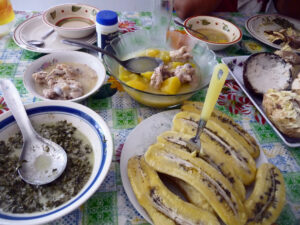
Jessica Hardin is a Ph.D. student in anthropology at Brandeis University. In 2011 she received a Dissertation Fieldwork Grant to aid research on “Exchange and Health: Negotiating the Meaning of Food and Body among Evangelical Christians in Independent Samoa” supervised by Dr. Richard J. Parmentier. We interviewed Jessica to learn more about the complicated business of food, reciprocity and disease in the Polynesian nation.
I’d like to start with a general question to “set the stage”. In Samoa, how do moral concepts come to bear in the consumption of food?
I think the best way to start answering this big question is with the words of my interlocutor and friend. During an interview, a physician I will call Tina responded to my question about risk and non-communicable diseases (NCDs), including type II diabetes and hypertension, by saying “just being Samoan, that’s the biggest risk factor [for developing NCDs].” She went on to explain that the risk is tied to the pressures of food consumption and reciprocity. There is no better way to say this than to say that eating, cooking, and serving food in Samoa is complicated business. Learning who to serve, when to serve, and what to serve are lessons first learned by youth as they crowd back kitchens while elders conduct the affairs of funerals, church openings, or title bestowals. Presenting and giving food gifts comes in two forms: trays of food for consumption and pigs and boxes of tinned food for exchange. On these trays are piles of foods cooked from the umu, ‘earth oven,’ including many different kinds of meat, and sometimes Samoan-Chinese foods. These trays and cases of food define hierarchies and provide individuals and families with a sense of food-based well-being. While anthropologists often focus on the hierarchy-making capacity of food gifts, what I have found striking is the degree to which my interlocutors experience the pressure to be sure everyone has the appropriate portions, and that the aesthetics of the tray are correct, as a moral issue. When successfully achieved, individuals and their families are offered a sense of embodied wellness.
Sharing food within and between households is another way that food consumption is marked as a moral activity. Morality here is something like habitus, a taken-for-granted sense of rightness and wrongness that informs experiences of well-being. For eating events, ranging from the ritual distribution of food where consumption is implied but not enacted to household cooking and eating, consuming, accepting, and taking home food are all ways of expressing and experiencing well-being. To eat starches and meats, both a’ano (a word to describe the flesh of meat, starches, and humans) is to feel happy, well, and comforted by the presence and labor of the family that makes daily meals possible. In my household, daily cooking and eating together formed the central point from which all other activity flowed in and out.
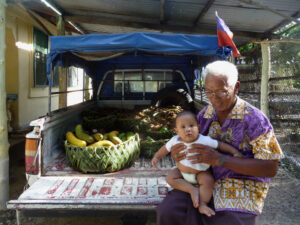
All the above suggests that well-being is constructed through food based gift-giving and consumption of specific categories and types of food. This becomes problematic for Samoans and researchers alike when obesity and NCDs are increasing at alarming rates. My interlocutors face daily dilemmas when the foods that provide the feeling that an event or a meal was satisfying and successful are also the foods that public health professionals, doctors, and nurses advise them to reduce. While most of my interlocutors understand that they should not drink their tea with sugar or use salt in their soups, serving tea and soup without those tastes risks appearing as if they either do not care for the one they are serving, or they are poor.
What have your impressions of the field and your host family been thus far? Do you feel well-prepared?
I moved in with my host family during my second week of fieldwork and it was a really fantastic way to get into things right away. Over six months, my relationship with my host family has changed from polite informality to almost forgetting that I was palagi, ‘white/foreigner,’ and a visitor. In the beginning, simple things like gossip wouldn’t start until after I went to bed but now the gossip starts earlier and I am permitted to sit and listen; increasingly I can even interject and ask questions. My interjections are usually met with a giggle because it still seems strange that I would even be interested in who was appointed to what position in the church or who should be more humble. My preliminary fieldwork immediately permitted me to become an accepted observer, but to become a participant has taken longer.
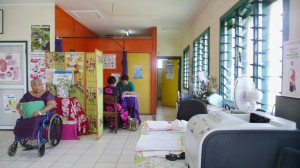
It continues to surprise me how often I am not explicitly told about things that are happening. I have come to realize that this is not because I am omitted from communication networks, but because it is expected that I should learn to know when things are going on on my own. That realization was a bit of a surprise but it also decreased the amount of frustration I would feel when I was late to learn of a church activity, or of someone close to me visiting the hospital for a complication due to diabetes. I expected to be told what was going on and why, but after a few months it became apparent that I had already been granted access, and to tell me about daily events was to pressure me to attend. If I was a fully-engaged participant, and not only observer, I should just go if I wanted. I was granted entry from the beginning, but I was still tentative about this access. I probably could have done more earlier, but I was tentative about crossing boundaries that I may not be able to detect. I was waiting to be invited and once I stopped waiting and started showing up to events and chatting with people, things started to really open up. I realized that it is not common to be invited to events or to people’s homes; either you belong or you don’t belong, and I belonged.
I have also realized that preliminary fieldwork is key. All of the relationships I developed through preliminary fieldwork in the islands and in the diaspora enabled me to participate in small talk conversations about which families I knew, which pastors I had met, and it really allowed people to take me seriously. During my preliminary fieldwork in Samoa, I made sure to donate to the church, I sang a song in front of the church, and was generally present in official capacities. I think people felt warmly about me because they remembered the shy palagi girl who had returned. In my absence I sent letters and some birthday and Christmas gifts, which solidified me as an absent family member.
I felt very well prepared. Conducting preliminary fieldwork in the islands and the diaspora gave me a great breadth of knowledge about Samoa but it also gave me a kind of credibility with interlocutors that has been invaluable. Samoa sees a lot of researchers. Samoan people are acutely aware of this and accustomed to it. Having preliminary research provided a basis from which interlocutors could trust me because I was not a researcher passing through for days or weeks or even a few months. Preliminary fieldwork allowed me to demonstrate my commitment to long-term understanding and engagement with Samoan culture and society.
“Evangelical” is a term that is of course very loaded in the United States. In order to avoid importing our preconceptions, could you explain what Evangelical signifies in the social and cultural context of Independent Samoa?
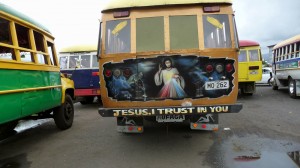
I think this is a really great question. And a difficult one. The categories that are academic and American do not translate neatly into a Samoan definition of evangelical. In Samoa the two relevant categories that describe church affiliation are “mainline” and “non-mainline” in English. Mainline churches are the traditional churches introduced by missionaries in the 1800s including Congregational, Methodist, and Catholic. These three denominations – Congregational being the most powerful – account for the great majority of church affiliation. Non-mainline churches are the “new” churches in Samoa that are evangelical and charismatic in their orientation. Evangelical and charismatic as descriptions of religious and spiritual orientations do not capture the way that in Samoa kinship, wealth, and residence constrain and constitute worship possibilities.
Evangelical is also a term used today only by the newest of the non-mainline churches as an indicator of their current revival. The initial non-mainline churches started a revival in Samoa in the 1970s and 1980s and then slowly became accepted and embedded into village landscapes. In Samoa today there is a more recent revival, starting in the 1990s. This new wave of non-mainline churches actively refer to themselves as evangelical while the older non-mainline churches do not adopt a language of evangelism or born-again identity. Interestingly, the word most contested is “Christian” because many say that all Samoans are Christian and thus evangelical becomes a marker of change and social difference. Central to this contestation is conflict over whether mainline churches are Christian in name only while evangelicals incorporate their spirituality into all aspects of their lives.
What each non-mainline church has in common is offering what they see as what mainline churches have lost: spirituality, choice, and freedom. Mainline churches are embedded in traditional culture and are central to the workings of fa’asamoa. ‘the Samoan way.’ The non-mainline churches see their revival centering around the decoupling of church and culture. These alternative churches offer not only a born-again identity and spirituality, but also an avenue for critiquing tradition, participating in alternative economic practices (giving gifts v. tithing), and avenues to avoid kin-based obligations.
What’s one issue or roadblock you’ve encountered so far during your fieldwork? How have you adapted?
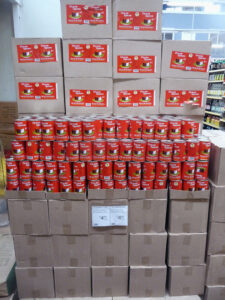
While access to village contacts and churches has been open, getting to other villages through government contacts has been challenging. NCDs in Samoa are a hot topic and often at the center of funding agendas for aid agencies and government ministries. While this might seem like it would provide opportunity for me as a researcher, in practice there has been sensitivity about opening up village programs and other programming to research by an individual anthropologist. I think this reflects something I hear in conversation often, that researchers are often perceived as selfishly taking data from Samoa and not only not returning, but also revealing negative aspects of Samoan society to the world without putting back into society. The linking of NCDs, obesity, and traditional Samoan culture is a sensitive issue and one that makes access challenging. I have adapted by seeking varied biomedical and public health contacts and approaching individuals and institutions through multiple avenues. I have learned that if one gatekeeper is blocking your way, there are often other gates to be checked. I started this long-term fieldwork with approximately 20 contacts from preliminary fieldwork; these 20 quickly turned to 40, and now to 100 over six months. I adapted by following up with anyone working in the field of NCDs, and maybe sometimes being a nuisance. In the beginning, this really works to get you embedded into professional and social networks.
How have the health practitioners that you have included in your fieldwork reacted to your project?
Health practitioners’ responses to me vary considerably based on how they perceive themselves as treating NCDs. For example, traditional healers think my work is great but do not understand why I want to talk to them because they do not see themselves as treating NCDs. They see themselves as treating problems like skin sores, dizziness or headaches, but see these as isolatable incidences instead of symptoms of NCDs. While they may agree that NCDs are a problem, and that my interest in the connection between health, faith, and food is an important one, they think it rather silly that I would want to talk with them about their work, which they see as disconnected from my NCD research agenda.
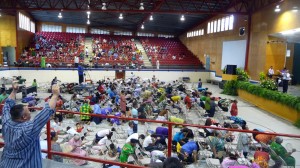
The physicians with whom I have interacted also think the intersection of health and faith is an important and pressing issue. However, most want to see my research in a quantitative form. For example, they want to know if Christians who fast on a regular basis are at lower risk of developing NCDs, or if they are in better control of their blood sugar or blood pressure. On the other hand, many welcome alternative methodologies to the quantitative measures of NCDs because most see NCDs as a cultural problem of food consumption, a lacking of health consciousness, and social priorities that are often put before the physical health of the body. Many see the problem of health as a problem that is exacerbated by mainline churches and therefore want me to criticize churches, or offer some evidence that would permit them to criticize churches. This is an explicit way in which the knowledge I am generating from my research is interpreted through church politics and entering into a broader societal debate about the nature of wealth and the role of the church in social welfare.
What’s one thing you wish you would have known before embarking? Or, what’s one piece of advice that you would give to those entering the field for the first time?
My advice is to write everything down, and say yes to everything. In the beginning you just don’t know what opportunities will be useful or offer new material or a new dimension to the work you’re doing. So just go to everything and say yes to everything.
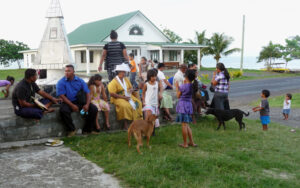
Reflecting back, I was very project-focused during preliminary fieldwork. In contrast, during my long-term fieldwork, I have been collecting new kinds of data and regularly adapting, shifting, and refining the methods I use. The iterative quality of this endeavor was surprising to me at first, and a bit destabilizing. I came to use my project proposal as a guide, but learned to be flexible. My advice would be to stay open to adapting on a regular basis; it is helpful and normal, and will happen every week, or every month.
The other thing I have learned is that it is very productive to take notes in multiple forms and media. Documenting data and my own initial analytic thoughts in many ways helps to capture different aspects of the day. This helps not only with looking back to trigger memory, but also with disciplining yourself to recognize different things as data. For instance, keeping spreadsheet logs of recordings with space to indicate keywords, initial reactions, or a memorable quote is one way. This is in addition to regular fieldnotes, interlocutor profiles, and a running log of analytic ideas. The point is that I might cover the same material, same interview or event in multiple ways, but have learned that I get something different from each representation.
I remember getting advice like this from my professors, and then I just did it because I thought that was what an anthropologist should do. I have realized months in that it is vital. I would also say it is important to trust your initial reactions and document them in your notes. Your ideas will change, but it will get you into the habit of documenting. Writing fieldnotes becomes more than a task but becomes a way of thinking and processing material and the habit of fieldnote writing is something I am cultivating all the time. Six months in, 500 pages of notes, and 15 sermons later, you’ll forget what you thought would always be clear. Write everything down.
If you are a current or former Wenner-Gren grantee and are interested in being interviewed for the blog, please contact dsalas@wennergren.org.